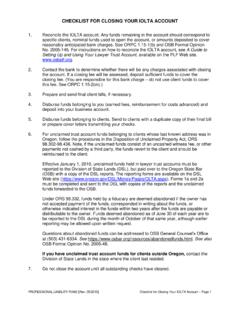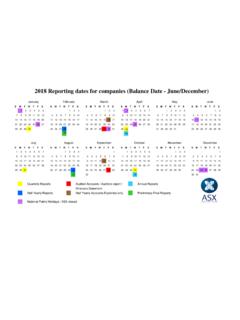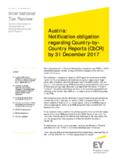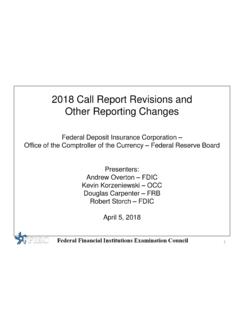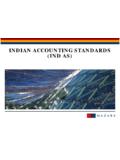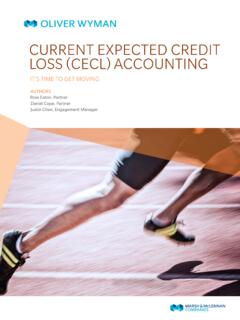Transcription of 2017 LEGISLATION ALERTS Domestic Relations - …
1 ISSUE 133 | JANUARY 20181 LAW UPDATES2017 LEGISLATION ALERTSD omestic RelationsSB 492 (Ch. 457) Exchange of Financial InformationSB 492 provides a post-judgment, out-of-court process for parties subject to a spousal support award to exchange financial documents. In order to review the other party s financial documents, the requesting party must send his or her own financial documents with the request. Requests must be in writing and may only be made once every two years. The documents that can be requested include the first and second page of the most recent state and federal income tax returns or, if no tax returns were filed, all records of income for the prior calendar year. The parties may redact all identifying contact information, including addresses, employer addresses, and account numbers, but must provide their name on the documents. If the request is properly made and the requesting party s documentation is provided, the other party must provide the requested 492 takes effect January 1, 510 (Ch.)
2 486) Department of Justice Data SharingSB 510 expands the Division of Child Support s access to information on delinquent obligors. It clarifies that an account for purposes of data matching includes those receiving insurance benefits or payments of more than $500 under a liability or noninsured motorist policy, thus capturing those receiving or entitled to substantial insurance payments in the data-matching requirement. The measure also requires companies to provide three days written notice to the Division of Child Support prior to disbursement of a benefit or payment if information sharing on a delinquent obligor has not already been established. SB 510 takes effect on January 1, 511 (Ch. 459) Liquidated DebtThe Division of Child Support within the Oregon Department of Justice may create an overpayment in favor of the State when it sends money from an obligor to an obligee and the amount of the payment or the person paid is incorrect. For example, an obligor may send a check to the Division to process.
3 The Division must process that payment and send money to the obligee within two days of receipt of the payment. If there are not sufficient funds to cover the written check, the Division is left with an overpayment to the obligee and may begin recovery attempts. Currently, the Division may only create an account receivable if the recovery is against the obligee and there is limited ability for the Division to develop a repayment plan. SB 511 creates a process for creating accounts receivable for moneys paid out in error to any person inBRIEF | Malpractice Prevention Education for Oregon Lawyers | 2or entity and allows collection efforts against the person or entity that sent the payment. Additionally, the measure gives the Division and the person 90 days to either pay in full or begin payment under a plan before the account receivable becomes 511 takes effect on January 1, 512 (Ch. 651) ParentageCurrently, gender-specific language in the paternity statutes excludes same-sex couples from the duties and obligations of being a parent to children.
4 SB 512 creates a gender-neutral list for establishing when a person is a parent of a child. The effect of the bill is to include same-sex parents in the duties and obligations of opposite-sex parents under Oregon law, including child support orders, benefit eligibility determinations, and juvenile dependency and delinquency proceedings. SB 512 takes effect on January 1, 513 (Ch. 460) Child Support NoticesThe Division of Child Support must follow state and federal guidelines for processing child support, including the federal Fair Credit Reporting Act, which previously required 10 days notice to a person when requesting the person s consumer report. A consumer report provides the Division with information about a parent who owes child support, including income and location. In 2015, the Fair Credit Reporting Act was revised, removing the 10 days notice requirement and allowing for the use of consumer reports for enforcement of a child support order.
5 SB 513 removes the current requirement that the Division notify an obligor or obligee when it requests a consumer credit report in child support cases and allows the Division to request reports to enforce a support 513 takes effect on January 1, 514 (Ch. 461) Obligee NotificationThe Division of Child Support is required to give notice to an obligee of certain actions the Division is taking against an obligor. In many of these cases, the information in the notice is heavily redacted and may create confusion for the individual receiving the notice. Currently, the Division must provide such a notice when (1) it issues an order for withholding, (2) intends to refer a case to the Department of Revenue for the purposes of collecting tax returns, (3) intends to report information on the obligor s payments to a credit reporting agency, or (4) intends to place a lien on the obligor s property. In these instances, the obligee is entitled to information but has no ability to object to the Division s actions.
6 SB 514 removes the notice requirements to obligees for these four Division actions. It does not affect the notice requirements for the obligor or any other required 514 takes effect on January 1, 516 (Ch. 462) Child Support Due DatesSB 516 requires all orders for child or spousal support processed through the Division of Child Support to have payment due on the first day of the month. The bill also specifies that for enforcement purposes, income withholding will be on the first day of the month, even if the due date is another day, and allows for a monthly average for alternative payment structures. SB 516 specifies liens and actions to which this requirement does not apply, and specifies when support payments become 516 takes effect on January 1, 517 (Ch. 463) Credits on Child SupportThe Division of Child Support is responsible for processing over $1 million each day in medical and child support of children. Occasionally, payments are made from one party to another outside of the Division s disbursement unit.
7 In some instances, one party may owe money to the State for services, ISSUE 133 | JANUARY 20183such as Temporary Assistance for Needy Families. Current law requires the Division to credit outside payments to the amounts owed the State if the parties make sworn statements that the payments were made and substantial evidence corroborates the statements. If money is not owed to the State, the outside payment is credited to the account of the obligee, even if there are no arrears or outstanding balance owed by the obligor. The Division identified this process as inefficient internally and susceptible to fraud externally. SB 517 removes the requirement to credit an outside child support payment to moneys owed to the State. Additionally, the measure limits the amount of credit on payments owed to the obligee to the current balance of the account. SB 517 takes effect on January 1, 522 (Ch. 341) Life Insurance RecoveryIn a family law proceeding in which a spousal or child support order is created, the court may also require the obligor to maintain or purchase a life insurance policy to guarantee continued support in the event of the obligor s death.
8 Typically, the life insurance must be maintained until the end of the support obligation. In some instances, such as an obligor changing employment and changing life insurance policies, the obligor s policy may not reflect the court-ordered beneficiary to a policy. In those circumstances in which a third party is designated as a beneficiary and receives the proceeds of a life insurance policy, the court-ordered beneficiary must bring a claim against the third-party beneficiary for unjust enrichment in order to recover the support obligation. That action requires proving that the third-party beneficiary had notice of the obligor s obligation to the court-ordered beneficiary prior to receiving the 522 provides a mechanism for a court-ordered beneficiary of a life insurance policy in a family law proceeding to bring an action against a third-party beneficiary. The measure specifies that entry of the judgment constitutes notice to third-party beneficiaries of the obligation.
9 SB 522 limits the court-ordered beneficiary to recovery of no more than the support obligation amount or arrears and provides a defense for third-party beneficiaries who purchase the policy against which a claim is 522 takes effect on January 1, 682 (Ch. 464) Suspension of Child Support OrdersSB 682 adds new provisions to support enforcement laws that create a rebuttable presumption that an obligor incarcerated for 180 or more consecutive days is unable to pay child support and suspends accrual of the child support obligation during incarceration. This presumption may be rebutted. The suspended child support order will be automatically reinstated at 50 percent of the previously ordered amount on the first day of the month following the 120th day of the obligor s release from incarceration. Within 60 days of this reinstatement the administrator will review the support order for possible modification. SB 682 mandates that an obligor s incarceration for at least 180 consecutive days or the obligor s release from incarceration is a substantial change of circumstances for child support modification proceedings.
10 Proof of this incarceration is also sufficient for a credit and satisfaction against support arrearages for each month of incarceration and the 120 days following release from incarceration. SB 682 also makes conforming amendments within ORS , which governs motions to modify support orders when support enforcement services are being provided. It eliminates the provision reinstating support obligations on the 61st day following an obligor s release from incarceration. SB 682 takes effect on January 1, 2018. However, support orders modified to zero prior to January 1, 2018, remain in force, with reinstatement at the full amount ordered 61 days after release from | Malpractice Prevention Education for Oregon Lawyers | 4SB 719 (Ch. 737) Extreme Risk Protection OrderSB 719 allows a family or household member to petition the court for an extreme risk protection order enjoining a person from possessing a deadly weapon. The petitioner has the burden of proof at the initial ex parte hearing, which must be held within one judicial day of the day the petition is filed.





